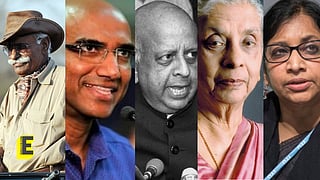
Amidst all the doubts rising around the Union Public Service Commission (UPSC), especially due to the trainee officer Puja Khedekar's controversy and allegations like forgery and fake certificates, questions are being raised against the commission, its processes and against the candidates as well..
In such an atmosphere, perhaps we should recall those valiant Civil Service officers who spoke up and did what is right, even when it was very difficult to do so...
The first thought that comes to people’s mind when they think of Civil Servants is the honour, respect, and adulation they receive, the elite status and employment perks they enjoy, the power that they command, and the hard work, dedication, and effort they put in to earn all those.
However, many overlook one crucial aspect of a Civil Servant’s life – their contributions to our society and country at large. Civil Servants are duty-bound to run the administration of India and serve her people. They enact policies framed by the elected government and make a great deal of difference in the lives of people through the powers vested in them, or through Civil Service Activism.
Here are some prominent Civil Servants who made a difference to our nation and society through extraordinary initiatives:
Starting his career as a Civil Servant as an assistant collector, TN Seshan rose to the ranks and became the 18th Cabinet Secretary of India in 1989. However, he is most known for his work as the 10th Election Commissioner of India.
During this tenure, Seshan earned a reputation for his strict enforcement of the election code of conduct and for taking bold steps to curb electoral malpractices — he allegedly reviewed more than 40,000 expenditure accounts and disqualified 14,000 candidates for false information during the 1999 General Elections.
Further, he introduced several measures to enhance the integrity of the electoral process, including the use of voter identification cards, the deployment of central paramilitary forces during elections, and the strict regulation of election expenses.
Fateh Singh Rathore was a prominent Indian wildlife conservationist and a key figure in the field of tiger conservation.
Rathore started his career in the Indian Forest Service and played a pivotal role in the establishment of Ranthambhore National Park in Rajasthan under Indira Gandhi’s Project Tiger initiative (1973), which later became one of the most successful tiger conservation projects in India. Under his guidance, Ranthambore became a model for tiger conservation efforts across the country.
He was also known for his deep understanding of tiger behaviour, as well as his efforts to curb poaching as the Vice-Chairman of Tiger Watch. Under his leadership, Tiger Watch rehabilitated several poachers and their families, who belonged to the Mogya Tribe, by providing them with dignified employment and clothing, food, and education education to their children.
Anna Rajam Malhotra was the first woman to hold the position of an IAS officer in independent India. She secured the first rank in the Civil Services Examination in 1951, which paved the way for other women to pursue careers in the Indian Administrative Service.
Anna Rajam Malhotra served as the Chief Secretary of West Bengal, making her the first woman to hold the highest bureaucratic post in a state. Her career spanned over three decades, during which she earned respect for her administrative skills and leadership qualities.
Further, she also played an instrumental role in setting up the country's modern port, i.e. the Jawaharlal Nehru Port Trust near Mumbai.
Dr RS Praveen Kumar is an Indian Police Service (IPS) officer from the 1995 batch of the Telangana cadre. A Dalit himself, he is known for his contributions to the upliftment of marginalized communities, particularly through his involvement in social welfare and educational initiatives.
Dr Praveen Kumar served as the Secretary of the Telangana Social Welfare Residential Educational Institutions Society (TSWREIS) and the Telangana Tribal Welfare Residential Educational Institutions Society (TTWREIS) till 2021. Under his leadership, these organisations helped provide quality education, mentorship, and a conducive environment for students from Scheduled Castes (SC), Scheduled Tribes (ST), and other marginalized communities.
Praveen Kumar implemented the P5 Model in these schools, incorporating a range of pioneering initiatives such as E-Plus Clubs, Voice for Girls, horse riding, filmmaking, music, dance, water sports, mountaineering, Ignitor, W Plus Clubs, Impact, and more. These programs were strategically designed to foster the holistic development of the children under his care. Supplemented by his SWAEROS (Social Welfare Aeros) initiative, many students from these schools went on to make a name for themselves through their remarkable achievements – most famously, Malavath Poorna, who became the youngest female climber to reach the peak of Mount Everest at the age of 13 in 2014.
A retired 1982 batch IAS officer, Aruna Sundararajan served as the Secretary of the Department of Telecommunications in the Government of India. Her tenure in this role was notable for overseeing initiatives and policies related to the telecommunications sector, including the rollout of 4G services and the planning for the introduction of 5G technology in India.
Sundararajan was also Kerala’s founding IT Secretary and played a key role in developing e-governance in the state. She spearheaded the Akshaya Project, which was the largest e-literacy project of its kind. She was also instrumental in the establishment of Digital University Kerala (IIITMK) and InfoPark, Kochi – both of which transformed the IT landscape of Kerala.
In addition, she also headed the Kerala government’s Kudumbashree project (1997), a community-based initiative for women's empowerment, poverty reduction, and employment opportunities.
